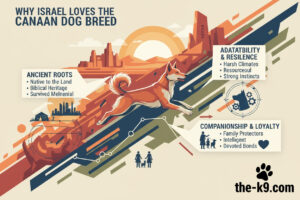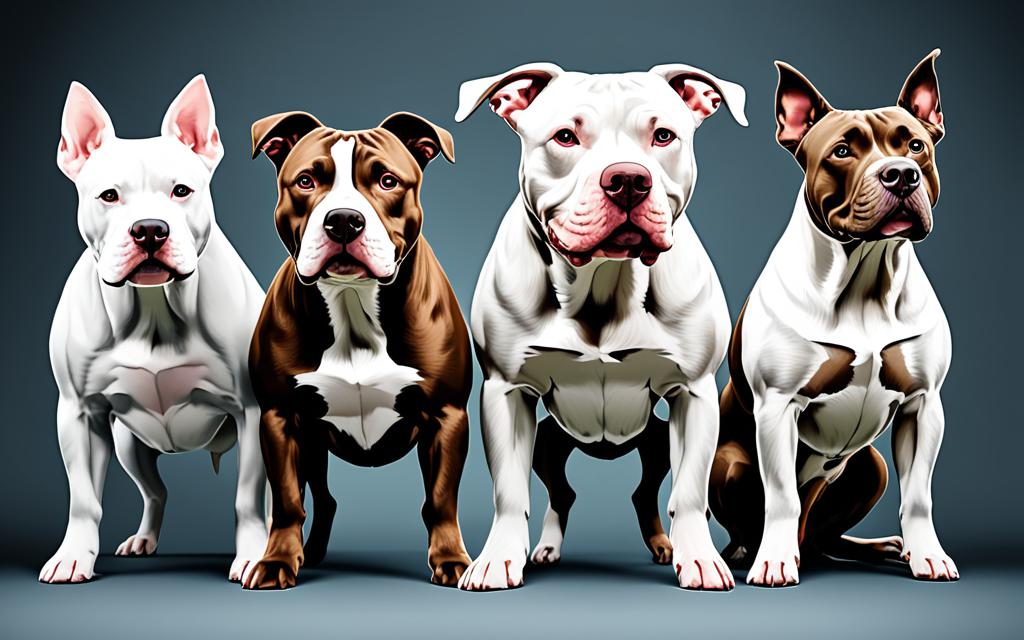
Did you know that pit bulls are often misunderstood due to their association with dogfighting? Contrary to common belief, pit bull is actually an umbrella term that encompasses several breeds commonly referred to as “bully breeds.” Types of Pit Bull Dog Breeds include the American Bully, American Pit Bull Terrier, American Staffordshire Terrier, Staffordshire Bull Terrier, and American Bulldog. Each breed has its own unique characteristics and temperament.
Key Takeaways: Types of Pit Bull Dog Breeds
- Pit bulls are an umbrella term for several bully breed dog breeds.
- The American Bully, American Pit Bull Terrier, American Staffordshire Terrier, Staffordshire Bull Terrier, and American Bulldog are all types of pit bull breeds.
- Each pit bull breed has its own distinct characteristics and temperament.
American Bully
The American Bully is a relatively new breed that originated in the 1980s and 1990s. While the American Bully is recognized by the United Kennel Club, it is not yet recognized by the American Kennel Club. This breed is known for its broad and compact build, making it a visually impressive dog. However, it’s not just their physical appearance that sets them apart.
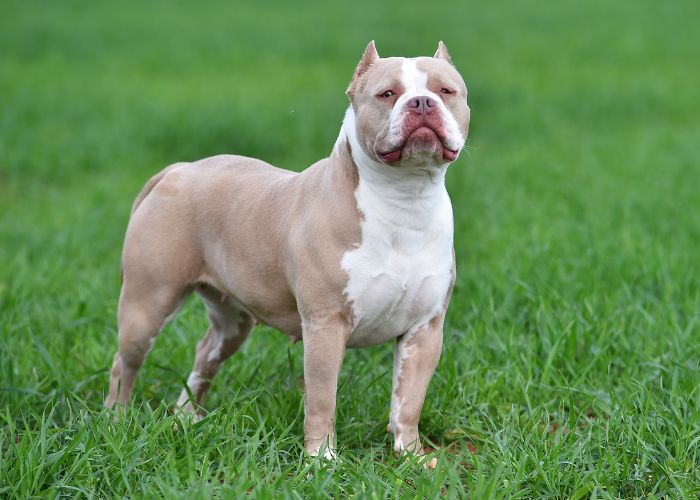
One of the defining characteristics of the American Bully is its gentle and affectionate temperament. Despite its intimidating look, the American Bully is known to be a friendly and sociable breed. They are often described as loving, loyal, and good-natured dogs that thrive on human companionship. However, like any dog, proper training and socialization are essential to ensure they grow up to be well-behaved and balanced.
It’s important to note that the American Bully is not a breed for everyone. The breed requires a commitment from its owners to provide regular exercise and mental stimulation. They love to be active, so daily walks or play sessions are a must. Additionally, the American Bully is a social breed and benefits from interactions with other dogs and humans. Early socialization helps them develop into friendly and well-adjusted pets.
“The American Bully is a breed that combines strength, loyalty, and affection. They are truly remarkable companions for individuals and families who understand their needs and provide them with appropriate care and training.” – PetExpert Magazine
In summary, the American Bully is a striking breed with a gentle and affectionate temperament. With the right care, training, and socialization, they can make wonderful family pets and loyal companions.
American Pit Bull Terrier
The American Pit Bull Terrier is a breed with a rich history that traces back to 19th-century England and North America. Recognized by the United Kennel Club, these dogs are known for their loyalty and affection towards their families.
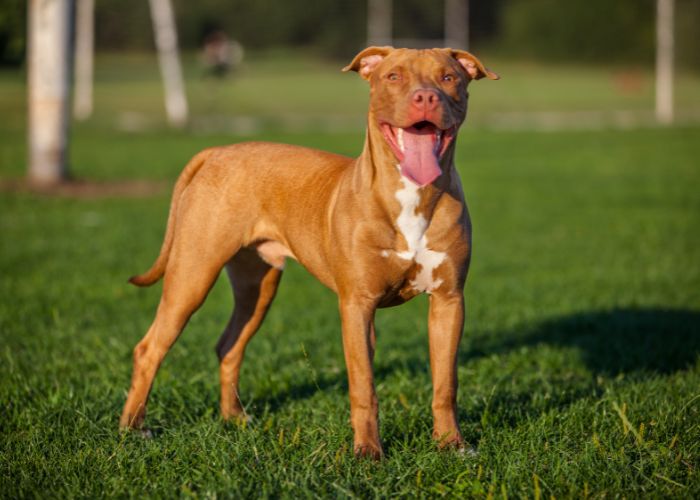
While American Pit Bull Terriers may have a high prey drive and can be selective with other dogs, with proper training and socialization, they can become well-behaved and friendly companions.
To ensure the American Pit Bull Terrier thrives in a household, consistent training is crucial. These intelligent dogs respond well to positive reinforcement methods and benefit from structured training sessions.
Socializing the Pit Bull Terrier from a young age is also essential. Introducing them to various people, animals, and environments will help them develop into confident and well-rounded dogs.
“Consistent training and socialization are key factors in raising a well-behaved American Pit Bull Terrier. They respond well to positive reinforcement and thrive in environments where they are exposed to diverse experiences.”
When training an American Pit Bull Terrier, it’s important to focus on positive reinforcement techniques such as rewards and praise. This breed is highly motivated by praise and will quickly learn new commands and behaviors when rewarded.
Training Tips for American Pit Bull Terriers:
- Start training early: Begin training your Pit Bull Terrier as soon as you bring them home. Early socialization and training will establish a foundation of good behavior.
- Be consistent: Use consistent commands and reward systems to reinforce desired behaviors and discourage unwanted ones.
- Focus on positive reinforcement: Reward your Pit Bull Terrier with treats, praise, and play when they demonstrate good behavior. This positive approach will motivate them to repeat those behaviors.
- Provide mental and physical stimulation: Pit Bull Terriers are intelligent and energetic dogs. Engage them in activities that challenge their minds and provide opportunities for physical exercise.
- Enroll in obedience classes: Professional training classes can provide guidance and support in training your Pit Bull Terrier and help them become well-behaved members of society.
By investing time and effort in training and socialization, you can unlock the full potential of your American Pit Bull Terrier and enjoy a loving and well-behaved companion for years to come.
American Staffordshire Terrier
The American Staffordshire Terrier, also known as the AmStaff, is a breed that shares a common ancestry with the American Pit Bull Terrier. Unlike their English counterparts, American Staffordshire Terriers were not commonly used for dogfighting. These dogs are larger and known for their loyalty, playfulness, and good nature with their families.
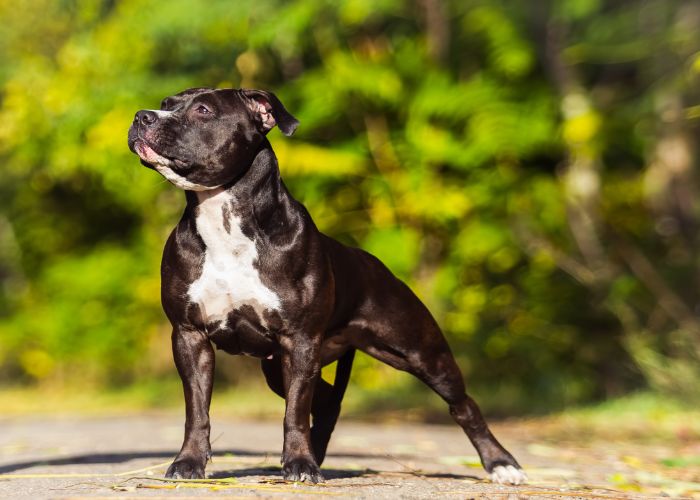
Just like any other pitbull breed, owning an American Staffordshire Terrier comes with certain responsibilities. It is important to check the local legislation before bringing an AmStaff into your home, as breed-specific bans may be in place in certain areas. Knowing the laws and regulations can help you ensure compliance and avoid any legal issues related to pet ownership.
“American Staffordshire Terriers are loving and devoted family dogs. They thrive in environments where they receive plenty of love, attention, and socialization.” – Dr. Emily Johnson, Veterinarian
Pitbull-Friendly Cities
When considering owning an American Staffordshire Terrier or any pitbull breed, it’s essential to choose a city that is pitbull-friendly. These cities typically have legislation that focuses on responsible pet ownership and does not discriminate against specific breeds. Some pitbull-friendly cities in the United States include:
- Denver, Colorado
- Miami, Florida
- Phoenix, Arizona
- Minneapolis, Minnesota
- Tampa, Florida
- Portland, Oregon
Owning an American Staffordshire Terrier in a pitbull-friendly city ensures you can provide a safe and welcoming environment for your furry companion. These cities often have resources and amenities tailored to pitbull owners, such as designated dog parks, training facilities, and pet-friendly accommodations.
| Characteristics | Description |
|---|---|
| Size | Large, muscular build |
| Temperament | Loyal, playful, and good-natured |
| Exercise Needs | Regular exercise to keep them physically and mentally stimulated |
| Training | Consistent training and socialization from an early age |
| Living Environment | Requires a secure and spacious living environment |
Staffordshire Bull Terrier
The Staffordshire Bull Terrier, also developed in 19th-century England, is a breed known for its unwavering loyalty and affection towards its family members. Despite its history in dogfighting, the Staffordshire Bull Terrier has proven to be a loving and devoted companion.
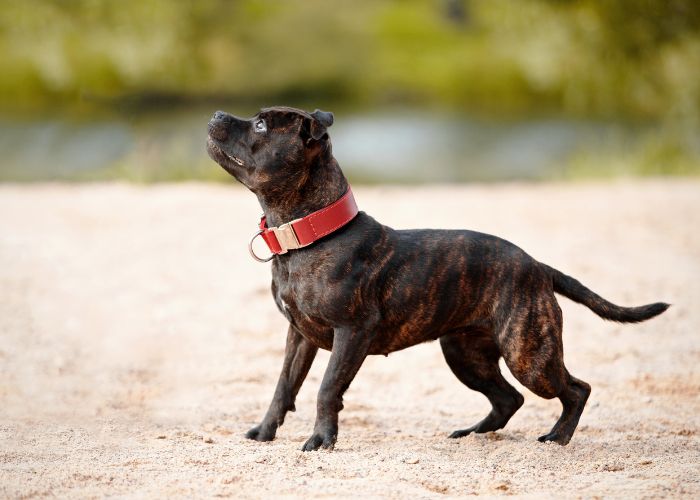
These dogs thrive in households where they have constant companionship and plenty of attention. Providing them with a loving and structured environment is essential for their well-being.
However, it’s important to note that Staffordshire Bull Terriers may not always get along well with other dogs. Early socialization and training can help them develop appropriate behaviors and ensure peace in multi-dog households.
When considering the Staffordshire Bull Terrier as a pet, it’s crucial to find pitbull-friendly housing options that welcome this breed. Unfortunately, some places have breed-specific restrictions, making it challenging for pitbull owners to find suitable accommodations.
Pitbull-Friendly Housing
For Staffordshire Bull Terrier owners, finding pitbull-friendly housing can be a priority. It’s important to research and inquire about housing policies that accept all dog breeds, including Staffordshire Bull Terriers.
When searching for pitbull-friendly housing, consider the following:
- Look for rental properties with no breed restrictions: Many landlords and property management companies have adopted breed-neutral policies that do not discriminate based on breed.
- Check local laws and regulations: Some cities and states have breed-specific legislations that may impact a dog owner’s ability to find suitable housing. Research the local laws to understand the restrictions and requirements.
- Connect with pitbull advocacy groups: Pitbull advocacy organizations often have resources and information on pitbull-friendly housing options. They can provide guidance and support in finding housing that welcomes Staffordshire Bull Terriers.
Remember, responsible ownership and proper care are essential for owning any dog, including the Staffordshire Bull Terrier. Providing them with love, attention, and pitbull-friendly housing creates a harmonious environment for these loyal and affectionate companions.
| Housing Tips for Staffordshire Bull Terrier Owners | Description |
|---|---|
| Research breed-neutral rental properties | These properties have no breed restrictions, increasing the chances of finding pitbull-friendly housing. |
| Familiarize yourself with local laws | Understanding breed-specific legislation in your area can help you navigate housing options more efficiently. |
| Connect with pitbull advocacy groups | Pitbull advocacy organizations can provide valuable resources and support in finding housing that welcomes Staffordshire Bull Terriers. |
American Bulldog
The American Bulldog is a breed that traces its roots back to English Bulldogs and was initially used in bull-baiting sports. Over time, this strong and muscular breed has evolved into a loving and devoted family companion known for its extreme affection and protectiveness towards its loved ones.
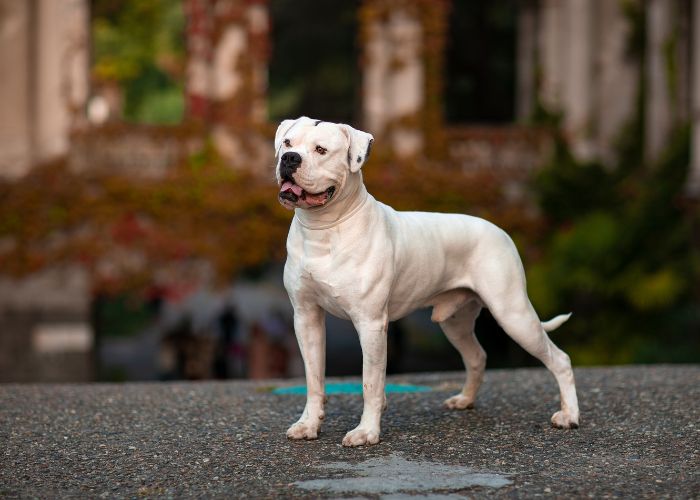
To ensure that American Bulldogs are friendly and well-behaved around people outside of their household, early training and socialization are essential. These activities help mold their behavior and instill good manners in various social settings.
If you’re considering adopting an American Bulldog, there are numerous pitbull rescue organizations dedicated to finding loving homes for these beautiful animals. These organizations play a vital role in rescuing and rehabilitating pitbull breeds, including the American Bulldog, and matching them with caring families who can provide the love, care, and attention they deserve.
By adopting an American Bulldog through a rescue organization, you not only provide a forever home for a deserving dog, but you also contribute to the ongoing effort to reduce the number of pitbulls in shelters and promote responsible pet ownership.
Remember, a rescued American Bulldog can bring endless joy and loyalty to your life, all while giving them a second chance at a happy and fulfilling life.
Pitbull Health Issues
Like any other dog breed, pitbulls are susceptible to certain health issues. It is essential for pitbull owners to be aware of these potential health concerns to ensure the well-being of their beloved pets. Regular visits to the veterinarian, a balanced diet, exercise, and proper grooming are crucial in maintaining optimal health for pitbulls.
Common Health Concerns in Pitbulls:
- Hip Dysplasia
- Thyroid Conditions
- Heart Diseases
Hip dysplasia is a common orthopedic condition that affects pitbulls, where the hip joint doesn’t develop properly. This can cause pain, lameness, and difficulty in mobility. Regular exercise, maintaining a healthy weight, and providing joint supplements can help manage this condition.
Thyroid conditions, such as hypothyroidism, can occur in pitbulls. This can lead to weight gain, lethargy, and skin issues. Regular blood tests and medication, as prescribed by a veterinarian, can help manage this condition and ensure the pitbull’s overall well-being.
Heart diseases, including congenital defects and valve disorders, are also common in pitbulls. Regular check-ups with a veterinarian, monitoring for abnormal heart sounds, and following a heart-healthy diet can help manage these conditions and improve the pitbull’s quality of life.
It is important for owners to be proactive in detecting and addressing any potential health issues in their pitbulls. Regular veterinary care, adherence to a nutritious diet, and keeping up with exercise and grooming routines are essential for the overall health and happiness of pitbulls.
Pitbull Advocacy Efforts
Due to breed-specific bans and misconceptions surrounding pitbulls, there are numerous advocacy efforts aimed at dispelling myths and promoting responsible ownership. Pitbull advocates work tirelessly to educate the public about the true nature of pitbulls, raise awareness about breed-specific legislation, and support pitbull-friendly housing and cities.
These dedicated individuals and organizations strive to change public perception and provide accurate information about pitbulls. They believe that with proper understanding and education, pitbulls can be recognized as the loving and loyal companions they truly are.
The Power of Education
Pitbull advocates understand the importance of education in changing people’s perceptions of these breeds. By providing accurate information about pitbulls’ temperament, history, and behavior, advocates dispel the negative stereotypes associated with them. This education process helps potential pet owners make informed decisions about owning a pitbull and ensures that these dogs are placed in responsible and loving homes.
Advocacy and Awareness
Breed-specific legislation (BSL) is a contentious issue that targets specific breeds based on stereotypes rather than individual behavior. Pitbull advocates actively challenge and raise awareness about BSL, emphasizing the importance of responsible ownership and evaluating dogs on an individual basis rather than restricting entire breeds. By advocating against BSL, they seek to protect the rights of pitbull owners and promote fair treatment for all dogs.
Pitbull-Friendly Housing and Cities
Pitbull advocates also work towards creating pitbull-friendly housing policies and advocating for pitbull-friendly cities. They collaborate with property owners, landlords, and legislators to eliminate breed restrictions in rental properties and communities. Their efforts aim to ensure that pitbulls and their owners can find suitable housing without discrimination based on breed.
These advocacy initiatives not only benefit pitbulls and their owners but also contribute to building stronger and more inclusive communities. By promoting understanding, responsible ownership, and fair treatment, pitbull advocates play a vital role in creating a society where pitbulls are accepted and valued for the loving companions they are.
Conclusion: Types of Pit Bull Dog Breeds
Pitbulls are diverse breeds with their own unique temperaments and characteristics. Despite their unfair reputation, many pitbulls are loving, loyal, and affectionate family pets. Responsible ownership, proper training, and socialization are key to raising a well-behaved pitbull.
Additionally, supporting pitbull advocacy organizations and promoting pitbull-friendly cities and housing can help create a better environment for these misunderstood breeds. By working together, we can break down the stereotypes surrounding pitbulls and promote a more inclusive and understanding society.
Remember, pitbulls are not inherently dangerous or aggressive. Just like any other breed, they are a product of their environment and upbringing. With the right care and attention, pitbulls can be wonderful companions and bring joy to any household.














